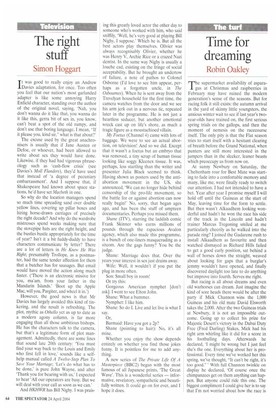The right stuff
Simon Hoggart
It was good to really enjoy an Andrew Davies adaptation, for once. Too often you feel that our nation's most garlanded adapter is like some annoying Harry Enfield character, standing over the author of the original novel, saying, 'Nall, you don't wanna do it like that, you wanna do it like this, gerra bit of sex in, you know, can't beat a spot of the old rumpy, and don't use that boring language, I mean, "If it please you, kind sir." what is that about?'
The excuse used by the great anachronisers is usually that if Jane Austen or Defoe, or whoever, had been allowed to write about sex they would have done. Likewise, if they had had vigorous phraseology such as 'cash-flow crisis' (see Davies's Moll Flanders), they'd have used that instead of 'a degree of pecuniary embarrassment'. And I suppose that, if Shakespeare had known about space stations, he'd have set Macbeth in one.
So why do the location managers spend so much time spreading sand over double yellow lines, covering up pillar boxes and hiring horse-drawn carriages of precisely the right decade? And why do the wardrobe mistresses spend weeks making sure that the stovepipe hats are the right height, and the bustles bustle appropriately for the time of year? Isn't it a bit fuddy-duddy to have characters communicate by letter? There are a lot of letters in He Knew He Was Right; presumably Trollope, as a postmaster, had the same tender affection for them that a butcher has for sausages. But email would have moved the action along much faster. (There is an electronic missive for you, ma'am, from your father in the Mandarin Islands.' Boot up the Apple Mac, will you, Pargiter, and wheel it in.') However, the good news is that Mr Davies has largely avoided this kind of tinkering, and the result is refreshing. The plot, mythic as Othello yet as up to date as a modern agony column, is far more engaging than all those ambitious bishops. He has the characters talk to the camera, but that's a legitimate form of plot management. Admittedly, there are some lines that sound late 20th century: 'You must find your way back to the Louis and Emily who first fell in love,' sounds like a selfhelp manual called A Twelve-Step Plan To Save Your Marriage; 'Let's do what has to be done,' is pure John Wayne, and after 'Thank you for bearing with us,' I expected to hear 'All our operators are busy. But we will deal with your call as soon as we can.'
And HKHWR has Bill Nighy. I was prais ing this greatly loved actor the other day to someone who's worked with him, who said sniffily, 'Well, he's very good at playing Bill Nighy, I suppose.' Which he is. But all the best actors play themselves. Olivier was always recognisably Olivier, whether he was Henry V, Archie Rice or a crazed Nazi dentist. In the same way Nighy is usually a louche cad, existing on the fringe of social acceptability. But he brought an undertow of failure, a note of pathos to Colonel Osborne (I'd love to see him appear, perhaps as a forgotten uncle, in The Osboumes). When he is sent away from the Trevelyan household for the first time, the camera watches from the door and we see his arm jerk out in a nervous tic, repeated later in the programme. He is not just a heartless seducer, but another emotional wreck cast up on life's shore, as much a tragic figure as a moustachioed villain.
My Foetus (Channel 4) came with lots of baggage. We were to see an actual abortion, on television! And so we did. Except that it wasn't a foetus but an embryo that was removed, a tiny scrap of human tissue looking like soggy Kleenex tissue. It was, perhaps, less startling than the writer and presenter Julia Black seemed to think. Having shown us posters used by the antiabortion movement in the US, she announced, 'We can no longer hide behind censorship of the pro-life movement, so the battle for or against abortion can now really begin!' No, sorry, that began ages ago, and has been the stuff of umpteen documentaries. Perhaps you missed them.
Shane (ITV), starring the laddish comic Frank Skinner who earns millions of pounds through the rapacious Avalon agency, which also made this programme, is a bunch of one-liners masquerading as a sitcom. Are the gags funny? You be the judge.
Shane: Marriage does that. Over the years your interest in sex just drains away.
Wife: Well, it wouldn't if you put the plug in more often.
Son: Small boy in room!
Or try this: Gorgeous American nymphet [don't ask]: I went to see Elton John.
Shane: What a bummer.
Nymphet: I like him.
Shane: So do I. Live and let live is what I say.
Or, Barmaid: Have you got a 2p?
Shane (pointing to hair): No, it's all mine.
Whether you enjoy the show depends entirely on whether you find those jokes funny. It is pointless for me to add anything.
A new series of The Private Life Of A Masterpiece (BBC2) began with the most famous of all Japanese prints. 'The Great Wave'. This is a wonderful series — informative, revelatory, sympathetic and beautifully written. It could go on for ever, and I hope it does.


















































































 Previous page
Previous page